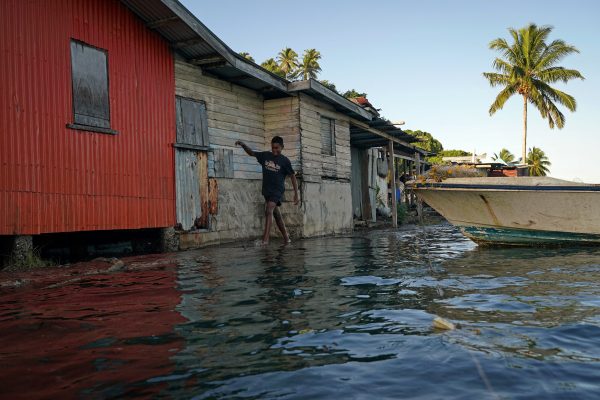People have lived continuously on islands in the Western Pacific Ocean — far from continental shores — for more than 3000 years, surviving the effects of volcanic eruptions, tsunamis and different manifestations of climate change. This did not happen by luck.
It happened because Pacific peoples evolved a comprehensive body of place-based traditional knowledge that secured their livelihoods in the face of environmental adversity. Their knowledge anticipates disaster and short-term climate variability and shows how to cope with their impacts. This knowledge also gave Pacific Island societies a high degree of resilience, something that contrasts markedly with the simplistic narratives of vulnerability that many use to characterise the region today.
Not only is it said that Pacific Island peoples are vulnerable and lack resilience but it is also said that the only way they can survive is through ‘adaptation’ to climate change, underpinned by non-place-based Western scientific understandings.
Few western-trained scientists have ostensibly stopped to wonder at the water-conservatory practices of pre-globalisation Pacific peoples. These range from aqueducts that carried water across valleys on Aneityum (Vanuatu) to the staircases of cut-and-fill terraces (laua) on the steeplands of Kadavu (Fiji) where taro crops sustain residents through cyclone and drought.
Pacific peoples’ techniques for food preservation, sustainable marine-food production and housebuilding are also ingenious. The ‘cyclone houses’ (gamali) of Pentecost (Vanuatu) have proved better able to withstand hurricane winds than any made from modern materials. The pushback by Pacific peoples against the demeaning global narratives of helplessness is unsurprising.
The uncritical imposition of adaptive solutions foregrounding western-scientific worldviews on societies that privilege contrasting and typically spiritually-founded worldviews is a root cause of the failure of externally-designed climate-change interventions in places like the Pacific Islands.
Research in the Pacific Islands shows that effective and sustainable adaptation to climate change is being hindered because it is widely perceived by locals as a foreign preoccupation, one invariably explained in western-scientific terms.
There are two problems. Most external interventions ignore the traditional understandings and worldviews of residents, attempting instead to introduce ‘alien’ ideas and solutions that are different from those that have sustained Pacific peoples for many generations.
Another problem is that many people living in non-western contexts explain their world in ways that contrast markedly with those of western science. The contrast is between ‘spirituality’ and ‘science’ — the former privileging a worldview that is often place-based and sees traditional knowledge as the solution to climate-associated challenges.
Many western-trained scientists and policymakers are quick to identify these kinds of conflicts as ‘barriers’, thereby fuelling the deficit framing that often dominates conversations about the Pacific Islands region. The notion of spirituality is often dismissed in these discussions, thereby creating a view of local agency as lacking — ‘people prefer to pray rather than act’ is a commonly-heard sentiment. Yet what we call ‘spirituality’ among Pacific peoples is actually a gateway to a body of traditional knowledge with time-tested effectiveness.
Though spirituality is foundational to Pacific Island cultural beliefs and practices, development and adaptation initiatives overwhelmingly perpetuate scientific and technocratic fixes — climate change is almost exclusively introduced as a science-informed, rather than a faith-informed, issue. This pattern has persisted despite deafening empirical support that the eco-centric, nature-embedded and spiritually-attuned Pacific Island way of life is more sustainable than the anthropocentric, nature-extractive and extirpative practices that underpin the western economic paradigm.
Consultation with and integration of Pacific Islander spirituality in enabling environmentally sympathetic development, conservation and culturally attuned climate change adaptation is long overdue.
Pacific Island peoples have lived and adapted sustainably for millennia, so it seems self-evident that pundits would invite, study and use their worldview orientations as foundations for place-based future-coping. Dismissing matters of spirituality from the adaptation agenda is a missed opportunity and foolishly undermines the UN 2030 Agenda for Sustainable Development. The literature on sustainable development in the Pacific Island region, though, remains surprisingly ‘muted’ on the beneficial role that spirituality may play as an adaptation-enabling force.
It is high time to rediscover, re-examine and re-engage the sustainability–spirituality relationship from the perspective of Pacific Island communities. The lessons that have been learned elsewhere about Indigenous adaptation and conservation need to be applied urgently in the Pacific.
Spirituality is naturally intertwined with adaptation to change and notions of sustainable development. It is counterproductive to unlink these issues or engage with them in isolation from each other. Given the paucity of research examining the nexus between spirituality and effective adaptation to change, spirituality should be habitually integrated in adaptation discourse to sustain future place-based coping.
Given the entanglement of spirituality and sustainability, contemporary adaptation policy and practice should engage with them concurrently. Doing so will harness their synergistic capacity and enable more effective sustainable development and climate change adaptation in Pacific Island countries.
Patrick Nunn is Professor of Geography and Director of the Sustainability Research Centre in the School of Law and Society at the University of the Sunshine Coast.
Johannes Luetz is Director of Research Development and Associate Professor at Alphacrucis University College. He also holds adjunct appointments at the University of New South Wales and the University of the Sunshine Coast.
Postscript:
The authors would like to draw attention to a Call for Papers (CFP) currently inviting expressions of interest to contribute to a forthcoming book on traditional spirituality and sustainability. Contributions involving authors who represent Indigenous or traditional knowledge-holders are especially encouraged.

